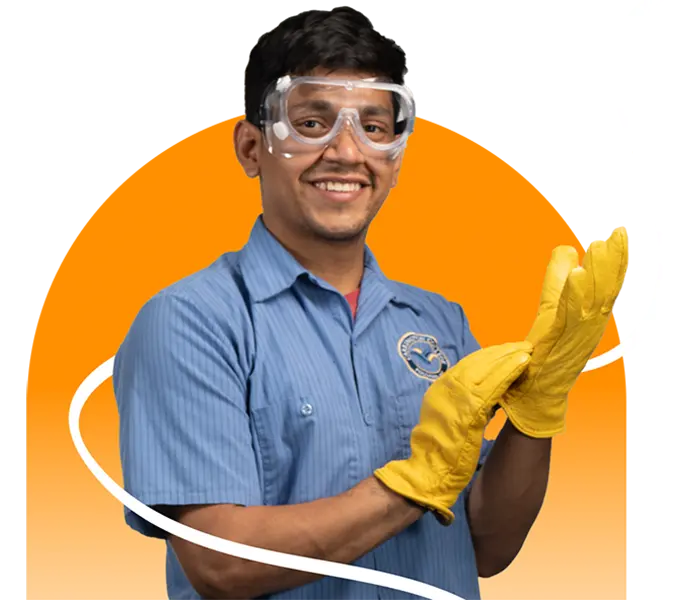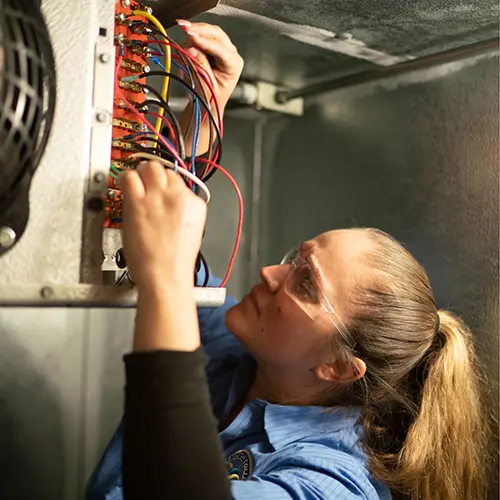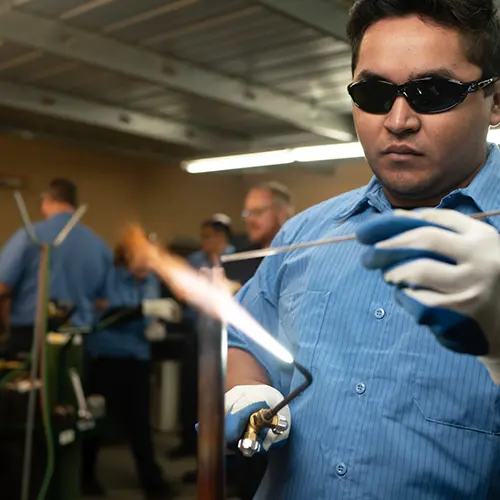Heating, Ventilation, Air Conditioning, and Refrigeration (HVAC-R)

Request Information
All fields using an asterik (*) are required.
Request Information
*Required Field

Program Details
What Will I learn
Upon completion of the Heating, Ventilation, Air Conditioning, and Refrigeration program, graduates will be able to:
- Compare basic and advanced heating ventilation, air conditioning and refrigeration theory.
- Apply the theory in the installation, operation, maintenance, and repair of equipment and systems.
- Discuss HVACR schematics and wiring diagrams.
- Value all local and national safety practices related to the installation and servicing of HVACR equipment and systems.
Military Policy
Cost & Financial Aid
Your education is an investment in your future, and Carrington College is here to help. We offer a variety of financial aid options, including federal, state, and private programs, as well as student loans, grants, and scholarships are available for those who qualify. Each program has different requirements and application instructions. Our team is here to guide you through the options and application process.
Academic Cost
For complete details on current tuition costs, please refer to the Academic Catalog.
Location Availability
Enroll at SJVC, Carrington’s sister school. Carrington College is no longer enrolling for this program, our sister school SJVC is. Students will still have the same faculty, and location.
Accreditation & Approvals
Carrington College is accredited by the Accrediting Commission for Community and Junior Colleges, 428 J Street, Suite 400, Sacramento, CA 95814; 415 506 0234 an institutional accrediting body recognized by the Council for Higher Education Accreditation and the U.S. Department of Education. Additional information about accreditation, including the filing of complaints against member institutions, can be found at accjc.org.
For comprehensive information on Carrington College’s accreditation and approvals, visit carrington.edu/accreditation-and-approvals/.
Course Catalog
Program Specific Disclosures
Continuing Education For Graduates
Student Outcomes
DANIEL M.
2022 HVAC-R Student

Career Opportunities
Heating, air conditioning, and refrigeration mechanics and installers—often called HVACR technicians—work on heating, ventilation, cooling, and refrigeration systems that control the temperature and air quality in buildings.
The following are examples of what HVACR technicians do, according to the U.S. Bureau of Labor Statistics:1
- Install, clean, and maintain HVACR systems
- Install electrical components and wiring
- Inspect and test HVACR systems and components
- Discuss system malfunctions with customers
- Repair or replace worn or defective parts
- Recommend maintenance to improve system performance
- Keep records of work performed
Check out our guide on becoming an HVAC-R Technician.
If you enjoy mathematics, mechanics, and hands-on work, you may enjoy a career as a heating, ventilation, and air conditioning (HVAC) technician. These professionals apply their knowledge of machines, building construction, and electrical design to install and repair heating, ventilation, air conditioning, and refrigeration (HVAC-R) systems. They make sure buildings’ heating and cooling systems are functioning properly.1
Heating, Ventilation, Air Conditioning, and Refrigeration (HVAC-R) FAQ
-
HVAC-R technicians work on each part of the acronym: heating, ventilation, air conditioning, and refrigeration systems. This can include installing and maintaining these systems, as well as dealing with electrical components and wiring.2
-
While how long it takes to complete training is often dependent on the student, Carrington College’s HVAC-R program can be completed with a Certificate of Achievement in as few as 10 months.
-
The first step to becoming an HVAC-R technician is education. According to the Bureau of Labor Statistics, many HVAC-R technicians receive postsecondary instruction from technical and trade schools or community colleges that offer programs in heating, air conditioning, and refrigeration. Some states require HVAC-R technicians to be licensed. Check your state and local area’s requirements to see if you need to become licensed. According to the BLS, the U.S. Environmental Protection Agency (EPA) requires technicians who work with refrigerant-cooling systems to be certified with appropriate refrigerant handling.3
-
While not all states require HVAC-R technicians to have degrees, according to the BLS, employers generally prefer applicants with postsecondary education or those who have completed an apprenticeship.3
Sources:
- www.bls.gov/ooh/installation-maintenance-and-repair/heating-air-conditioning-and-refrigeration-mechanics-and-installers.htm#tab-2
- www.bls.gov/ooh/installation-maintenance-and-repair/heating-air-conditioning-and-refrigeration-mechanics-and-installers.htm#tab-1
- www.bls.gov/ooh/installation-maintenance-and-repair/heating-air-conditioning-and-refrigeration-mechanics-and-installers.htm#tab-4